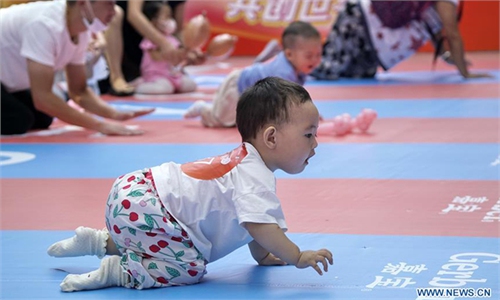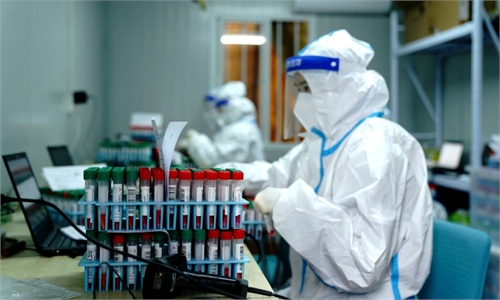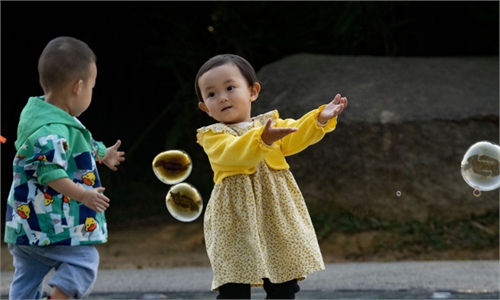'Medicine God' in Central China found guilty, but faces no punishment for illegal trading of epilepsy medication

Photo:VCG
In less than a year after China approved domestically-developed anti-epilepsy drug Clobazam, a father in Central China's Henan Province whose daughter is epileptic finally received a verdict from a local court over his case for privately buying the medicine from overseas and trading it online before it was legally available in the Chinese market.
The father, surnamed Hu, was found guilty of illegal sale of goods but will not face any criminal punishment, according to the judgement of a court in the Zhongmu county on Thursday.
Hu reportedly began buying Clobazam from overseas via the internet and sold to other families with epileptic children in 2020.
Synthesized in the 1960s with the primary goal of providing greater efficacy with fewer benzodiazepine-related side effects, Clobazam has been approved in more than 100 countries and regions to treat epilepsy and is regarded as the last resort to tackle a few specific types of epilepsy that affect minors.
But the medicine was listed as a second category psychotropic drug in China, meaning that it is potentially addictive and must be strictly controlled. Under this circumstance, a number of Chinese patients had to purchase the medication from overseas via private agencies or foreign websites.
In July 2021, Hu was arrested together with other four mothers with epileptic children on suspicion of trafficking, transporting and trading drugs. The prosecutors decided not to charge the four mothers, but filed a lawsuit against Hu, according to media reports.
Hu stood trial for the first time in March 2022. He was released on pending in April 2022. When the second trial in the case opened on Thursday, the prosecutor noted that Hu had been engaged in illegal purchase and sale of a controlled substance.
Liu Chang, Hu's attorney, stressed to the court that, in essence, Hu's behavior was a good faith effort to try and save and help each other, which conforms with the definition of China's regulations of the behavior of production, import and sale of medicines with self-rescue and mutual assistance for non-profit purposes.
Liu said that the judgment in this case reiterated the Supreme People's Court's rules for identifying narcotic drugs and psychotropic drugs, that is, narcotic drugs have dual attributes and should be judged in light of where they come from and how they are used.
For psychotropic medicines like Clobazam that are indeed used for medical treatment, the court adopted the defendant's position and resolutely refused to recognize it as a drug, reflecting humanity of the judiciary, Liu told media.
After the trial, the court explained to media that Hu had made profit worth about 500,000 yuan by selling Clobazam. This has disrupted the order of the drug market, and therefore he stood guilty. This sentence would also help prevent others from imitating his behavior. However, considering that the medicines Hu bought and sold are used to treat epileptic patients and did not lead to a serious social impact, no penalty was imposed, the court said.
Clobazam gained public attention in China in November 2021 as the arrest of Hu and other four mothers leading to thousands of parents pleaded on social media platforms for legal access to the then domestically unapproved medicine that could provide a lifeline for their children.
The National Health Commission (NHC) replied in December 2022, saying that it is researching the medical needs of patients and coordinating with other government departments to organize bulk procurements and imports of Clobazam.
In March 2022, the NHC released a list of 50 medical institutions that would take the lead in importing and using Clobazam.
A generic version of Clobazam, produced by Yichang Humanwell Pharmaceutical in Central China's Hubei Province, was awarded the country's first market approval for the medication in September 2022. It is priced at 84 yuan per package that contains 28 tablets of 10 milligrams each, which is reportedly "the world's lowest" price.
Clobazam is among the various medicines that had been made newly available in China as the country in recent years enhanced efforts in medicine accessibility after the issue of difficult access to and high prices of some rare medicines in China caught public attention in 2017 with the release of a film tiled Dying to Survive.
The film is based on the story of Lu Yong who imported affordable generic anti-cancer medicines from India and sold them online to help chronic myeloid leukemia patients in China. Lu was dubbed ''the Medicine God'' by Chinese netizens due to his efforts in providing inexpensive medicine to Chinese mainland leukemia patients.
Along with the efforts of Chinese governments, in the past five years, a total of 618 medicines have been included into the nation's medical insurance system, according to media reports.
Global Times



